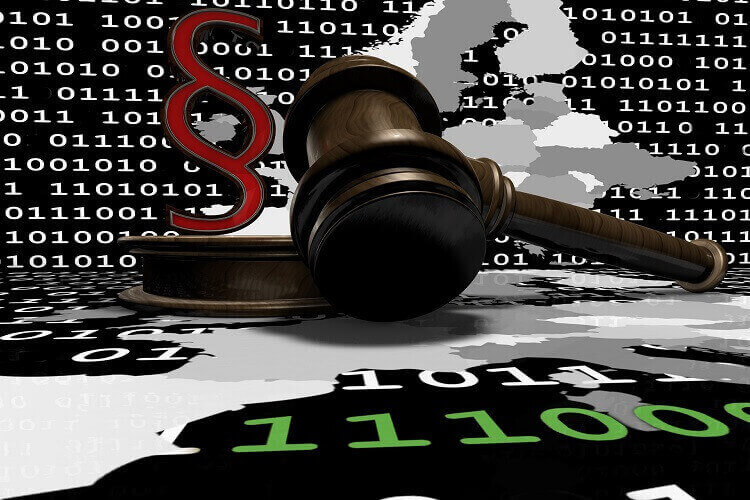The right to be forgotten only applies within the EU
The right to be “forgotten” has existed for more than five years, and does not mean that everything that has been uploaded to a person at some point in the future will remain on the internet for ever and ever and can be found there. Because that can sometimes cause problems when, for example, grad in the application phase for a new job, and the new potential employer first looks what the net as the “new employee” spits out.
The practice of resumes and thus possibly periods of life that are not conducive to a new position being scoured by companies and institutions in the internet is quite common and rather the rule than the exception. Therefore, the right to be forgotten is an important point in protecting personal information. But this right applies only within the EU, and not worldwide.
The right to be forgotten only applies within the EU
The right to be “forgotten” has existed for more than five years, and does not mean that everything that has been uploaded to a person at some point in the future will remain on the internet for ever and ever and can be found there. Because that can sometimes cause problems when, for example, grad in the application phase for a new job, and the new potential employer first looks what the net as the “new employee” spits out.
The practice of resumes and thus possibly periods of life that are not conducive to a new position being scoured by companies and institutions in the internet is quite common and rather the rule than the exception. Therefore, the right to be forgotten is an important point in protecting personal information. But this right applies only within the EU, and not worldwide.
Google does not have to delete search results worldwide
Since the existence of the internet forgetting scheme in 2014, over 850,000 applications have been received by Google for deletion of links. According to Google, 45 percent of the offending entries were removed from the search result lists.
Article 17 of the GDPR, which has been in force since 25.05.2018, stipulates the right to delete personal data by law. However, this (like many other) regulations is a bit spongy, so there is no explicit right to be forgotten. Because if this were implemented consistently then it would also apply worldwide, to which the information is really no longer to be found.
European law, which applies to the states of the EU, has no legally binding effect in other countries. Therefore, Google is not obliged to delete any objectionable links worldwide. This decision was confirmed on 24.09.2019 by the European Court of Justice on the basis of an application of an EU citizen for cancellation.
Although EU law does not require worldwide deletion, it does not prohibit it. This would allow the authorities of an EU Member State to force a worldwide erasure. It should be noted, however, that the personality right must be weighed against that of the public interest.
If, therefore, the public interest outweighs the individual interest of a person or organization, no deletion will take place in case of doubt. Incidentally, the decision to delete can take a long time, and in the case of a rejection of an application, the person concerned only has to go to court.
The Internet never forgets
We recommend the principle: “The Internet never forgets to follow”, and to think very well which information one reveals about itself on the Internet, and especially in social networks. Because even if you believe yourself to have images and other things effectively removed from the platform, you will never be sure if there is still somewhere a backup of the files.
By the way:
Even if results from the Google search result lists were deleted within the EU, but still available in other non-EU states, this hurdle can easily be leveraged via a VPN network. Because here it is easy to move your own location virtually to any country in the world. Take a look at the Google search results for one and the same search term with a changed country assignment.
More about other interesting topics around the protection of your data can be found here in our blog.
Google does not have to delete search results worldwide
Since the existence of the internet forgetting scheme in 2014, over 850,000 applications have been received by Google for deletion of links. According to Google, 45 percent of the offending entries were removed from the search result lists.
Article 17 of the GDPR, which has been in force since 25.05.2018, stipulates the right to delete personal data by law. However, this (like many other) regulations is a bit spongy, so there is no explicit right to be forgotten. Because if this were implemented consistently then it would also apply worldwide, to which the information is really no longer to be found.
European law, which applies to the states of the EU, has no legally binding effect in other countries. Therefore, Google is not obliged to delete any objectionable links worldwide. This decision was confirmed on 24.09.2019 by the European Court of Justice on the basis of an application of an EU citizen for cancellation.
Although EU law does not require worldwide deletion, it does not prohibit it. This would allow the authorities of an EU Member State to force a worldwide erasure. It should be noted, however, that the personality right must be weighed against that of the public interest.
If, therefore, the public interest outweighs the individual interest of a person or organization, no deletion will take place in case of doubt. Incidentally, the decision to delete can take a long time, and in the case of a rejection of an application, the person concerned only has to go to court.
The Internet never forgets
We recommend the principle: “The Internet never forgets to follow”, and to think very well which information one reveals about itself on the Internet, and especially in social networks. Because even if you believe yourself to have images and other things effectively removed from the platform, you will never be sure if there is still somewhere a backup of the files.
By the way:
Even if results from the Google search result lists were deleted within the EU, but still available in other non-EU states, this hurdle can easily be leveraged via a VPN network. Because here it is easy to move your own location virtually to any country in the world. Take a look at the Google search results for one and the same search term with a changed country assignment.
More about other interesting topics around the protection of your data can be found here in our blog.
Popular Posts:
Ad-free home network: Install Pi-hole on Windows
Say goodbye to ads on smart TVs and in apps: Pi-hole software turns your Windows laptop into a network filter. This article explains step-by-step how to install it via Docker and configure the necessary DNS settings in your FRITZ!Box.
How to tune your FRITZ!Box into a professional call server
A professional telephone system can be built using a FRITZ!Box and a laptop. This article shows step by step how to use the free software "Phoner" to schedule announcements and record calls – including important legal information (§ 201 StGB).
Why to-do lists are a waste of time
Do you feel unproductive at the end of the day, even though you've worked hard? Your to-do list is to blame. It tempts you to focus on easy tasks and ignores your limited time. This article explains why lists are "self-deception" and why professionals use a calendar instead.
Smartphone Wi-Fi security: Public hotspots vs. home network
Is smartphone Wi-Fi a security risk? This article analyzes in detail threats such as evil twin attacks and explains protective measures for when you're on the go. We also clarify why home Wi-Fi is usually secure and how you can effectively separate your smart home from sensitive data using a guest network.
Warum dein Excel-Kurs Zeitverschwendung ist – was du wirklich lernen solltest!
Hand aufs Herz: Wann hast du zuletzt eine komplexe Excel-Formel ohne Googeln getippt? Eben. KI schreibt heute den Code für dich. Erfahre, warum klassische Excel-Trainings veraltet sind und welche 3 modernen Skills deinen Marktwert im Büro jetzt massiv steigern.
Cybersicherheit: Die 3 größten Fehler, die 90% aller Mitarbeiter machen
Hacker brauchen keine Codes, sie brauchen nur einen unaufmerksamen Mitarbeiter. Von Passwort-Recycling bis zum gefährlichen Klick: Wir zeigen die drei häufigsten Fehler im Büroalltag und geben praktische Tipps, wie Sie zur menschlichen Firewall werden.
Popular Posts:
Ad-free home network: Install Pi-hole on Windows
Say goodbye to ads on smart TVs and in apps: Pi-hole software turns your Windows laptop into a network filter. This article explains step-by-step how to install it via Docker and configure the necessary DNS settings in your FRITZ!Box.
How to tune your FRITZ!Box into a professional call server
A professional telephone system can be built using a FRITZ!Box and a laptop. This article shows step by step how to use the free software "Phoner" to schedule announcements and record calls – including important legal information (§ 201 StGB).
Why to-do lists are a waste of time
Do you feel unproductive at the end of the day, even though you've worked hard? Your to-do list is to blame. It tempts you to focus on easy tasks and ignores your limited time. This article explains why lists are "self-deception" and why professionals use a calendar instead.
Smartphone Wi-Fi security: Public hotspots vs. home network
Is smartphone Wi-Fi a security risk? This article analyzes in detail threats such as evil twin attacks and explains protective measures for when you're on the go. We also clarify why home Wi-Fi is usually secure and how you can effectively separate your smart home from sensitive data using a guest network.
Warum dein Excel-Kurs Zeitverschwendung ist – was du wirklich lernen solltest!
Hand aufs Herz: Wann hast du zuletzt eine komplexe Excel-Formel ohne Googeln getippt? Eben. KI schreibt heute den Code für dich. Erfahre, warum klassische Excel-Trainings veraltet sind und welche 3 modernen Skills deinen Marktwert im Büro jetzt massiv steigern.
Cybersicherheit: Die 3 größten Fehler, die 90% aller Mitarbeiter machen
Hacker brauchen keine Codes, sie brauchen nur einen unaufmerksamen Mitarbeiter. Von Passwort-Recycling bis zum gefährlichen Klick: Wir zeigen die drei häufigsten Fehler im Büroalltag und geben praktische Tipps, wie Sie zur menschlichen Firewall werden.





































